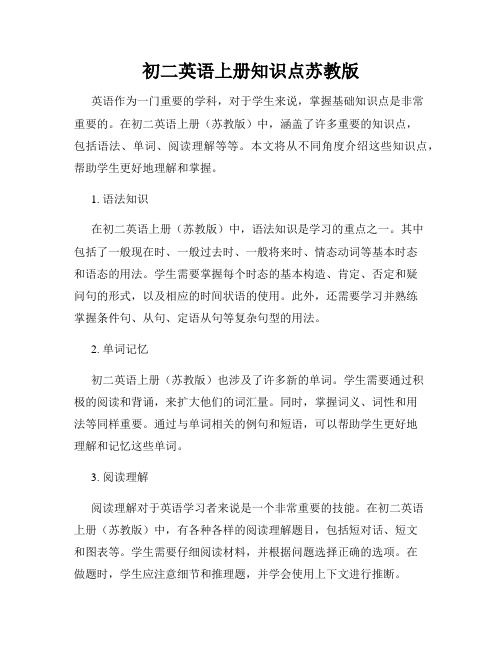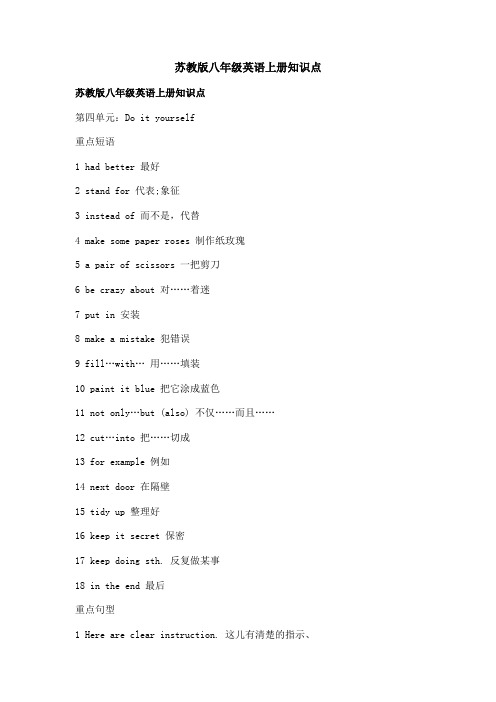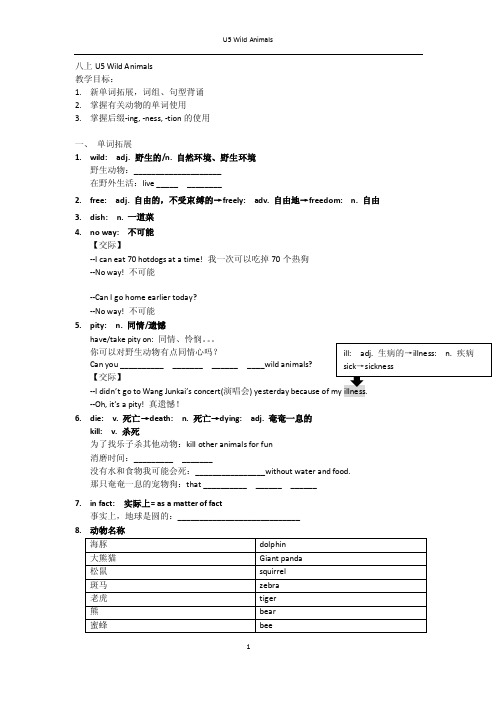八年级上册英语苏教版八年级au知识点
初二英语上册知识点苏教版

初二英语上册知识点苏教版(经典版)编制人:__________________审核人:__________________审批人:__________________编制单位:__________________编制时间:____年____月____日序言下载提示:该文档是本店铺精心编制而成的,希望大家下载后,能够帮助大家解决实际问题。
文档下载后可定制修改,请根据实际需要进行调整和使用,谢谢!并且,本店铺为大家提供各种类型的经典范文,如演讲稿、总结报告、合同协议、方案大全、工作计划、学习计划、条据书信、致辞讲话、教学资料、作文大全、其他范文等等,想了解不同范文格式和写法,敬请关注!Download tips: This document is carefully compiled by this editor. I hope that after you download it, it can help you solve practical problems. The document can be customized and modified after downloading, please adjust and use it according to actual needs, thank you!In addition, this shop provides you with various types of classic sample essays, such as speech drafts, summary reports, contract agreements, project plans, work plans, study plans, letter letters, speeches, teaching materials, essays, other sample essays, etc. Want to know the format and writing of different sample essays, so stay tuned!初二英语上册知识点苏教版初中的英语学习首先是一个记忆过程,尤其是升到八年级后,我们接触的内容增加了很多,需要记忆的词汇、句型和语法知识也随之增加了。
苏教版八年级上册英语知识点汇总

苏教版八年级上册英语知识点汇总一、词汇与短语1.高级词汇扩展:在七年级基础上,进一步学习并掌握更多高级词汇,涵盖更广泛的主题,如自然环境、科技、文学、历史、社会现象等。
2.短语与固定搭配:积累并熟练运用常用的短语、固定搭配和习惯用语,以增强语言表达的准确性和地道性。
二、语法知识1.时态深化:o一般过去时与现在完成时的对比:深入理解两种时态的区别,学会在适当语境中使用。
o过去进行时:学习并掌握过去进行时的用法,描述过去某个时间点正在进行的动作。
o将来时态:复习一般将来时,并引入新的将来时态表达法,如be going to, will等。
2.被动语态:学习并掌握一般现在时、一般过去时、一般将来时的被动语态,理解其用法和构成。
3.条件句:引入条件句的概念,学习零条件句(if...will...)、第一条件句(if...do...will...do...)的基本用法。
4.从句:初步接触并学习宾语从句、状语从句(如时间状语从句、原因状语从句)的用法和构成。
5.非谓语动词:了解动名词、不定式和分词(现在分词、过去分词)的基本概念和用法。
三、听力与口语1.听力技能提升:通过多样化的听力材料(如对话、短文、新闻、讲座等),提高学生的听力理解能力,包括捕捉关键信息、理解隐含意义等。
2.口语表达:加强口语训练,通过角色扮演、小组讨论、辩论等形式,提高学生的口语表达能力和交际技巧。
3.发音与语调:继续注重发音的准确性和语调的自然性,通过模仿、跟读等方式,提高学生的语音语调水平。
四、阅读与写作1.阅读技巧:培养学生快速阅读、仔细阅读、批判性阅读等多种阅读技能,通过阅读不同体裁的文章(如记叙文、说明文、议论文等),提高阅读理解能力。
2.阅读策略:引导学生学会预测、概括、推断等阅读策略,提高阅读效率和深度。
3.写作技巧:学习并掌握不同文体的写作技巧(如书信、日记、议论文等),通过写作练习,提高学生的写作能力。
4.写作过程:引导学生经历构思、起草、修改、校对等写作过程,培养良好的写作习惯。
初二英语上册知识点苏教版

初二英语上册知识点苏教版英语作为一门重要的学科,对于学生来说,掌握基础知识点是非常重要的。
在初二英语上册(苏教版)中,涵盖了许多重要的知识点,包括语法、单词、阅读理解等等。
本文将从不同角度介绍这些知识点,帮助学生更好地理解和掌握。
1. 语法知识在初二英语上册(苏教版)中,语法知识是学习的重点之一。
其中包括了一般现在时、一般过去时、一般将来时、情态动词等基本时态和语态的用法。
学生需要掌握每个时态的基本构造、肯定、否定和疑问句的形式,以及相应的时间状语的使用。
此外,还需要学习并熟练掌握条件句、从句、定语从句等复杂句型的用法。
2. 单词记忆初二英语上册(苏教版)也涉及了许多新的单词。
学生需要通过积极的阅读和背诵,来扩大他们的词汇量。
同时,掌握词义、词性和用法等同样重要。
通过与单词相关的例句和短语,可以帮助学生更好地理解和记忆这些单词。
3. 阅读理解阅读理解对于英语学习者来说是一个非常重要的技能。
在初二英语上册(苏教版)中,有各种各样的阅读理解题目,包括短对话、短文和图表等。
学生需要仔细阅读材料,并根据问题选择正确的选项。
在做题时,学生应注意细节和推理题,并学会使用上下文进行推断。
4. 写作技巧写作是英语学习的一项基础技能。
初二英语上册(苏教版)中,学生需要学习如何写作不同类型的文章,比如作文、书信等。
在写作方面,学生应注意语法和拼写的正确性,同时也要注重段落结构和连贯性。
另外,一些常用的表达和过渡词语也需要掌握,以提高写作的流畅程度。
总结起来,初二英语上册(苏教版)中的知识点涉及到语法、单词、阅读理解和写作技巧等。
学生需要通过不断学习和实践,掌握这些知识点,并在实际应用中提高自己的英语水平。
通过积极的阅读和写作训练,学生可以提高自己的英语能力,更好地应对学习和生活中的各种挑战。
让我们一起努力,打好英语基础,取得优异的成绩!。
苏教版八年级英语上册知识点

苏教版八年级英语上册知识点苏教版八年级英语上册知识点第四单元:Do it yourself重点短语1 had better 最好2 stand for 代表;象征3 instead of 而不是,代替4 make some paper roses 制作纸玫瑰5 a pair of scissors 一把剪刀6 be crazy about 对……着迷7 put in 安装8 make a mistake 犯错误9 fill…with… 用……填装10 paint it blue 把它涂成蓝色11 not only…but (also) 不仅……而且……12 cut…into 把……切成13 for example 例如14 next door 在隔壁15 tidy up 整理好16 keep it secret 保密17 keep doing sth. 反复做某事18 in the end 最后重点句型1 Here are clear instruction. 这儿有清楚的指示、2 You’d better get some tools. 你最好拿一些工具3 When you do DIY, you make, repair of decorate things yourself instead of paying someone to do it. 当你‘自己动手做’的时候,你自己做,修理或装饰东西,而不是付钱给别人做。
4 Now the living room has not only blue walls but also a blue ceiling and floor. 现在起居室不仅是蓝色,连天花板和地板也是蓝色。
5 They couldn’t stay there because one end of the shelf was much higher than the other! 它们不能呆在那儿,因为架子的一端比另一端高!6 Don’t paint the cat. 不要给猫涂色7 Cut some of the larger fruit into small pieces. 把一些较大的水果切成小块状。
江苏英语八年级上8AU5第五单元单词知识点

八上U5 Wild Animals教学目标:1. 新单词拓展,词组、句型背诵2. 掌握有关动物的单词使用3. 掌握后缀-ing, -ness, -tion 的使用一、 单词拓展1. wild: adj. 野生的/n. 自然环境、野生环境野生动物:____________________在野外生活:live _____ ________2. free: adj. 自由的,不受束缚的→freely: adv. 自由地→freedom: n. 自由3. dish: n. 一道菜4. no way: 不可能【交际】--I can eat 70 hotdogs at a time! 我一次可以吃掉70个热狗 --No way! 不可能--Can I go home earlier today? --No way! 不可能 5. pity: n. 同情/遗憾have/take pity on: 同情、怜悯。
你可以对野生动物有点同情心吗?Can you __________ _______ ______ ____wild animals? 【交际】--I didn ’t go to Wang Junkai ’s concert(演唱会--Oh, it ’s a pity! 真遗憾!6. die: v. 死亡→death: n. 死亡→dying: adj. 奄奄一息的kill: v. 杀死为了找乐子杀其他动物:kill other animals for fun消磨时间:_________ _______没有水和食物我可能会死:________________without water and food. 那只奄奄一息的宠物狗:that __________ ______ ______ 7. in fact: 实际上= as a matter of fact事实上,地球是圆的:____________________________ 8. 动物名称9.Xi Wang means “hope ” in Chinese. 10. be born: 出生我出生在七月二十三号:I ______ _______ on July 23rd . 11. beginning: n. 开始一开始,起初在某事的一开始 结束在某事结束的时候12. face: v. 面对/n. 脸独自面对困难:_______ ___________ ____ ___________ 面对问题:face problems 13. serious: adj. 严重的严重的问题:___________________严重的情况:serious situation14. live on: 以。
八年级上册英语(苏教版八年级)8AU6Grammar语言点(2021年整理)

(完整)八年级上册英语(苏教版八年级)8AU6Grammar语言点(word版可编辑修改)编辑整理:尊敬的读者朋友们:这里是精品文档编辑中心,本文档内容是由我和我的同事精心编辑整理后发布的,发布之前我们对文中内容进行仔细校对,但是难免会有疏漏的地方,但是任然希望((完整)八年级上册英语(苏教版八年级)8AU6Grammar语言点(word版可编辑修改))的内容能够给您的工作和学习带来便利。
同时也真诚的希望收到您的建议和反馈,这将是我们进步的源泉,前进的动力。
本文可编辑可修改,如果觉得对您有帮助请收藏以便随时查阅,最后祝您生活愉快业绩进步,以下为(完整)八年级上册英语(苏教版八年级)8AU6Grammar语言点(word版可编辑修改)的全部内容。
8AU6 Grammar 语言点1。
他来上海拜访他的朋友。
He came to Shanghai to visit his friends2. 政府应该立法来保护野生生物。
The government should make laws to protect wildlife。
3.为了赢得下个月的比赛, 他们每天刻苦训练。
They practice hard every day in order to win the match next month。
4。
我呆在那儿看会发生什么. I stayed there to /in order to see what would happen。
5。
为了不忘记,他记下了我的电话号码。
He wrote down my telephone number in order not to forget it。
6.为了赶上早班车, 今天早上我很早就起床了。
In order to catch the early bus, I got up early this morning.7. 我父亲经常鼓励我努力学习。
My father often encourages me to study hard.8。
八年级上册英语(苏教版八年级)8AU7 Reading语言点

8AU7Reading语言点1.Winter days are full of snow, …(1)winter days= the days of winter 冬天的日子 e.g. The days of spring are windy and bright.(2)be full of =be filled with 充满那个箱子里装满了苹果。
The box is full of apples.他检查工作时必须要再仔细一些——到处是错。
He must check his work more carefully —it’s full of mistakes. 花园里万紫千红。
The garden is full of colourful flowers.图书馆里学生满满的。
The library are full of students. = The library are filled with students.2.When trees and flowers forget to grow, …forget to do 忘记要去做某事。
(未做); forget doing 忘记做过某事。
(已做)办公室的灯还亮着,他忘记关了。
The light in the office is still on. He forgot to turn it off.他忘记他已经关了灯了。
He forgot turning the light off.别忘了关灯。
Don’t forget to turn off the light.我忘记了以前读过这本书。
I forgot reading the book.3.fly far away (from sp to another place) 飞往远处(1) My home is far from school. My home is 30 kilos from school.(2) grow---grew---growngrow up; grow into; grow flowers / grow plants4.What a perfect time (it is) to fly a kite! It is a perfect time to fly a kite.5. among flowers在花丛中6.hide from the April showers 躲避四月的阵雨(阵雨、阵雪、淋浴)(1)这个小偷到处躲避警察。
八年级上册英语苏教版八年级AUReading语言点

八年级上册英语苏教版八年级A U R e a d i n g语言点The document was prepared on January 2, 20218AU3 Reading语言点1. 遍及全世界 around the world= across the world = all over the world2.在一天之内 in a day=during a/ one day3. 8年级1班的学生 the Class1, Grade 8 students =the students in Class1, Grade 84.给某人发电子邮件 email to sb = send an email to sb =write an email to sb5.do fine (do well) 指生活方面的“好” 进展顺利; 过得称心如意(或心满意足)我听说这学期你们大家都很好。
I hear that all of you are doing fine at school this term.我兄弟是个好学生,功课很好。
My brother is a good student and does fine in his lessons.6. Yesterday Kitty’s teacher Mr. Wu invited me to join their school trip to the World Park.邀请某人做某事 invite sb. to do sth. 邀请某人去某地invite sb. to a place你邀请你的朋友来喝茶了吗Did you invite your friends to drink tea?你邀请米莉来你的聚会了吗Did you invite Millie to your party7. join 参加,加入,指加入某一种组织,党派,团体,人群等,成为其中一员,后接名词或代词,(become a member of). 而 join in参加谈话、比赛、娱乐项目等,且加入的活动规模较小take part in, 参加会议或群众性活动,着重说明参加者参加活动并在活动中发挥了作用。
- 1、下载文档前请自行甄别文档内容的完整性,平台不提供额外的编辑、内容补充、找答案等附加服务。
- 2、"仅部分预览"的文档,不可在线预览部分如存在完整性等问题,可反馈申请退款(可完整预览的文档不适用该条件!)。
- 3、如文档侵犯您的权益,请联系客服反馈,我们会尽快为您处理(人工客服工作时间:9:00-18:30)。
八年级上册英语苏教版八年级a u知识点SANY标准化小组 #QS8QHH-HHGX8Q8-GNHHJ8-HHMHGN#八年级英语课堂笔记8A Unit 31. climb the hill爬山→climb (up)…爬…①climb up the Great Wall爬长城②climb into the bed爬上床③climb through the window从窗户爬出来④climb over the wall翻越墙2. need to exercise and keep fit需要锻炼来保持健康⑴ keep fit, keep healthy, stay healthy保持健康keep sb + adj: keep us healthy keep sb + doing: keep workers working ⑵need作名词时,构成短语in need。
作行为动词时有人称和数的变化,后接不定式或动名词;当主语和它后面的动词之间有一种被动关系时,使用need doing或need to be done。
作情态动词时无人称和数的变化,后接动词原形。
①We should help people in need. ② He needs to study hard.③A lot of homework needs finishing.=A lot of homework needs to be finished.⑶ exercis e? n/v do morning /eye exercises. 做锻炼:do exercise 做练习:do exercises他每天锻炼。
He does exercise every day. / He exercises every day.3. come on (命令句)快,快点吧;走吧;跟我来;这边来吧Come on! We’ll be late for school.快点!我们上学要迟到了。
4. Let’s enjoy ourselves!⑴enjoy oneself=have a good time玩得高兴,过得愉快,反身代词与主语保持一致。
⑵Let’s do sth, shall we 除此以外的祈使句,无论是肯定式还是否定式,附加疑问部分一律用will you.. ①Don’t be late again, will you ②Open the door, will you ③Let us go home, will you5. take a boat trip乘船旅行,go past the Opera House经过悉尼歌剧院6. sit in a little coffee shop by the River Seine坐在塞纳河畔的一个小咖啡店里⑴coffee house咖啡店;茶馆,coffee shop咖啡店⑵by…在…旁边(比near近) Come and warm yourself by the fire.过来烤烤火。
7. take care保重;当心,小心⑴take (good) care of…=look after…well (好好)照顾… ⑵look out当心→look out of向…外看⑶be careful小心→be careful of/with…珍视;注意 Please be careful of your health. 请注意你的健康。
8. a beautiful building with a big garden and many trees介词短语with a big garden and many trees作后置定语,修饰名词a beautiful building。
9. foreign country外国,a foreign language一门外语10. have a wonderful/great/good time 玩得高兴;过得愉快 have a wonderful/great/good time + doing11. interesting places=places of interest有趣的地方;名胜 (注意此处的interest无复数)这里interest解释为“令人感兴趣的事或人”。
interest还表示“兴趣”,常用的短语有:show/have interest in sth对…某事感兴趣, show/have interest in doing sth对…做某事感兴趣①Daniel shows/has great interest in computers.②Daniel shows/has great interest in making his own home page.12. invite me to join their school trip to the World Park邀请我参加她们学校组织的去世界公园的旅行⑴invite sb to…邀请某人去某地→sb be invited to…某人应邀去某地,Millie invited me to her birthday party. →I was invited to Millie’s birthday party.⑵invite sb to do sth邀请某人做某事→sb be invited to do sth某人应邀做某事,We should invite more people to take part in the charity show.=More people should be invited to take part in the charity show.⑶join参加,加入某组织,如政党、社会团体等。
join sb , join sb in sth指和某人一起做某事。
join in…=take part in…参加某活动,attend出席。
试比较:①He joined the tennis club. ② The man joined the army at the age of 19.③ He joined in the game. ④ Did you take part in your school sports meeting⑤ We’re going to plant trees. Will you join us ⑥ He joined us in the game.13. at the beginning开始;起初⑴ at the beginning=in the beginning=at first=at the start开始;起初⑵ at last, finally, in the end后来;最后;终于,与上述短语“开始,起初”意思相反。
①at the beginning of…在…之初(后接时间)→at the end of…在…末尾,在…的尽头(后接时间或地点) 注意:没有in the beginning of…, in the end of…②from beginning to end自始至终;从头到尾。
注意:该短语不含定冠词the。
⑶begin with…=start with…先做…;以…开始. Let’s begin with Exercise 1.⑷表示“启程”、机器的“启动”只能用start。
Let’s start at 6:00 a.m. tomorrow.⑸ Well begun is half done. 良好的开端是成功的一半。
14. at the school gate在学校大门口at表示在较小的地方,如:at the theatre在剧院,at the party在聚会上,at the airport在机场,at the bus stop在公交站台,at the crossing, at the crossroads在十字路口15. get on a coach上长途汽车get on…/get off…上/下(车/船等),. get on/get off the plane上/下飞机16. a lot of traffic=heavy traffic=busy traffic交通拥挤,作主语时谓语动词用单数。
17. one / it / that (those)的区别Your coat is very nice. I will buy __one___ tomorrow.The weather in Beijing is colder than __that__ in Changzhou.People in China are more friendly than __those_ in the UK.I only have one copy of newspaper, do you want ___it_One 是指同类不同物,指代前面出现的单数名词,复数用ones;it指同类同物;that或those用于比较级中。
试翻译:The pyramids look like the real ones.18. whole :the whole world= all the world?????????? the whole day? = all day19. arrive at the World Park到达世界公园“到达”有三种表达, get to+某地,arrive at+小地方,arrive in+大地方,reach+某地。
get to,arrive at/in后接地点副词时不能用介词,常用的地点副词有here, there, home。
如:get/arrive here/there/home到这里/到那里/到家。
20. be made of metal 由金属制成⑴be made of…由…制成,强调从制成的成品上还能看得出原材料,物理变化。
The desk is made of wood. 这张桌子是木制的。
⑵be made from…由…制成,表示从成品上已经看不出原材料,化学变化。
Wine is made of grapes. 葡萄酒是葡萄酿成的。
⑶be made up of…由…组成,由…构成,指各个部分组成整体。
Our class is made up of 54 students. 我们班由54名学生组成。
⑷be made in…在某地制造 NOKIA mobile phones are made in Beijing.21. not …any more再也不=no more,no more, no longer用于be动词后、行为动词前⑴not …any more=no more…再也不…(表示程度、数量上的不再)⑵not …any longer=no longer…不再…(表示时间上的不再延续) .①When the baby saw his mother, he did not cry any more.②After having some bread, she was no longer hungry.⑴more and more…越来越…;越来越多… ⑵more or less几乎;差不多⑶what is more更有甚者;更为重要的是 .①I’ve more or less finished reading the book. 我差不多已经读完这本书。
